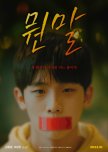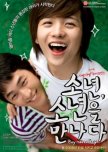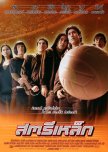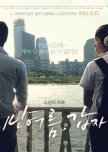
The transformative power of cinema to improve society
Taiwanese screenwriter, director and producer Angel I-Han Teng believes in the transformative power of cinema to improve society. In this way, he writes the script for 'Bao Bao' (親愛的卵男日記), an LGBT+ themed drama co-produced between Taiwan and the United Kingdom, which focuses on the struggles of same-sex couples to form families in that Asian island.Presented at Outfest, the Asia-Pacific Film Festival, in Los Angeles, United States, in 2018, and released in theaters in Taiwan and Japan that same year, the film, directed by Shie Guang Cheng, revolves around two homosexual couples: Joanne and Cindy, and Charles and Tim. The four young people live in London and plan to have children, but then they have to return to Taiwan, where challenges await them.
'Bao Bao' was written and made while Teng was residing in the United States, but it tells an exclusively Taiwanese story, but universal due to the impossibility of homosexual couples to adopt children and marry in countries where people of the same sex do not have the possibility of getting married.
For the filmmaker, the best result is to be able to make Taiwanese stories with Taiwanese actors and then let an international audience see and appreciate them.
Her training in Psychology allows the writer to develop complex characters in her work faced with complex dilemmas, such as homosexuality and the adoption of newborn children.
In her marriage to Joanne/Xu Jie An (Christine Ke), Cindy/Fang Rong Xin (Ries Emmie), is a young woman who is expecting two babies, but loses one. Having also lost trust in her partner, Cindy doesn't know where to go, who to believe, or whether it's her baby or not. So, he decides to return to Taiwan from London, where he has lived for some time. In her hometown, she will find care in Yang Tai / Ah Tai, (Yankee Yang), her childhood best friend, who promises to raise the baby with her.
Confused about what a family should be like, Cindy finally works up the courage to confront Joanne and the gay couple of Charles Watanabe/Du Bian Zhi Jiu (Yukihiko Kageyama) and Tim/Li Hao Ting (Daniel Tsai). At the time the film was filmed, equal marriage or homosexual marriage was not yet legalized in Taiwan. Even today, after this right has been legal since 2019, the existence of same-sex parents is still not acceptable for that society. And our protagonist trusts that that day will come.
With this, her first narrative feature film as a writer, the also sound specialist and with extensive experience working as a recording engineer and sound mixer, begins a filmography in which she addresses issues related to identity, gender, feminism and rights. humans with a subtle sensitivity, as can be seen in 'Rose Skirt' (玫瑰色的裙), 'The Fragrance of the First Flower', winner of the Gold Award for an investment fund at the GagaOOLala Pitching Sessions, or 'A Balloon's Landing'(我在這裡等你), 2024.
'Bao Bao', a film that allowed Angel I-Han Teng to obtain the Excellent Screenplay Award from the Taiwanese government, is also an example of his interest in the musicality of cinematographic components that go beyond the conventional limits between sound and music in cinema.
Teng's fascination with highlighting gender issues begins in his Family Psychology classes at the University: "Not only was I not familiar with same-sex parent households, but I noticed that all the examples the professor gave were from abroad. Those from Taiwan either didn't stand out or weren't seen. A creative light bulb went off in my head," he says. He adds: "I appreciate the beauty of individual differences although we share many similarities. The complexities of the human mind open my imagination to create works of art. I wrote many scripts and entered competitions, some of which completely changed the course of my career my life…".

Look for safe sex and a decent chat. Through a gay dating app, he has scheduled to meet Vince, the attractive and discreet neighbor, but the sexual encounter is interrupted by the unexpected arrival of his parents, and before them he will once again restrain his deepest but most difficult desire: "come out of the closet."
However, Dino cannot prevent the brand new dildo from being seen by his mother.
Vince is willing to wait. The wait is worth it: a friendly relationship begins to emerge between the two that may very well lead to something more.
With solid performances, a beautiful script, magnificent camera work and charming surroundings, the short film 'This Is Not A Coming Out Story' (2022), by Filipino filmmaker Mark Felix Ebreo, brings us fun moments and an irresistible visual chemistry of its two protagonists: Dino, played by AJ Sison, known for his role in 'U-Turn (2020)', 'Dito at doon' (2021) and 'Love in the Ungodly Hour' (2021) and Vince, a character assumed by Jel Tarun, actor known for his role in 'Silent Cries' (2023).
The short film also tells us about homophobia.
The soundtrack fits perfectly with the film story.
With a script by Mark Felix Ebreo himself, the cast closes with the performances of Jun Nayra, known for his performance in 'Bonifacio: Ang unang pangulo' (2014), 'Darna' (2022) and 'Sandwich' (2023), and Gigi Hernandez, known for her role in 'Sandwich' (2023), 'Ikigai: Life Is a Beautiful Ride' (2023) and 'Alapaap' (2022), playing Jerome and Liz, Dino's father and mother, respectively.
Committed to bringing queer narratives to spaces to increase the visibility of the stories of people who have not yet discovered their true identity, Mark Felix Ebreo won with this short film the Best Director award at the 1st Pelikulaya LGBTQIA+ International Film Festival, as well as a Honorable Mention in the Short Fiction category at the 34th CCP Gawad Alternatibo.
Additionally, 'This Is Not A Coming Out Story' won the Cardinal Gold Award with the highest honor, as well as the award for best screenplay at the 20th CineMapua International Student Film Festival.

How much and in what way will our own decisions and those of others affect us?
One of the most complex and uncomfortable topics in human relationships is infidelity, but our worst qualities, decisions and actions are a great tool for cinema, which can turn even the most twisted relationship into an emotional, deep, complex story. and explosive, which divides opinions and leads us to explore what we do not dare to see in ourselves.Infidelity is ugly and painful, and can be traumatic for many people, but it becomes interesting and arouses curiosity when it is a "tragedy of others", the kind that movies show us, and it is also a good way to learn about more about the subject, the reasons that lead us to betray our partner and the way we deal with all that.
'Spring Like a Lover', by director, screenwriter and editor Daisuke Shigaya, is a 2017 Japanese film that proposes an unusual love triangle between three homosexual men whose lives fatefully intertwine.
Kazu (Konosuke Furuya) distrusts her current boyfriend, Shin (Tact Igarashi), a moody photographer, because she believes he is unfaithful. After an argument, Kazu revisits her ex-boyfriend, Takashi (Kazuki Kawakami), but discovers that he is now married to a woman and is unaware that this man is the one Shin has been having sex with behind his back. After the reunion, Takashi rekindles his feelings for the person who once shared his bed.
In this story about sex, betrayal, obsession and toxic relationships, the lives of these three men become complicated after the infidelity of one of them towards his partner. Of course, no one deliberately wants to harm others, but that is exactly what they end up doing.
One night, Takashi tries to have sex with Kazu, but Kazu immediately rejects him, not wanting to be involved in a relationship with a married man, and returns to Shin's house.
In Kazu's absence, Shin goes out to the terrace where her boyfriend has a beautiful caged songbird and deliberately tries to make the bird fly out of the cage. When he doesn't succeed, he leaves the door open.
In this short film that explores the universality of human emotions and poses a question: How much and in what way will our own decisions and those of others affect us? When reality breaks through, this complicated love triangle leads to tears, confrontations , breakups and violence.
After returning home, Kazu and Shin's reunion allows them to reconcile and strengthen their relationship. However, Takashi has not been able to forget Kazu, so he confesses to his wife about his sexuality, and she breaks up with him, but not before accusing him of betrayal for not having been honest with her.
Kazu is the most empathetic character of the three. Because he cares about Shin, he is able to activate a protective instinct in him. She loves her boyfriend, so she will seek to prevent him from suffering the consequences of her own actions and decisions, even if the price is high. He has seen how the photographer is heading towards a precipice and since there is nothing he can do to stop him, he appears frustrated and helpless. The image in the bathtub is, in addition to being heartbreaking, symbolic in this sense.
Shin is not a good man who messes up and makes a mistake. Both the script and the film are responsible for emphasizing that she is deliberately unfaithful to her boyfriend, and this fact will unleash all the subsequent conflicts. In addition, he violates people's privacy by taking photos of them in the streets without their consent, so he has to flee when he is caught in the act, because although in Japan it is not a criminal offense to photograph people's faces in public, it can be a crime. a civil offense if the person who has been photographed finds or fears that their image may be published anywhere.
On the other hand, Shin shows a cruel and violent face, not only for hitting Takashi, but for retaliating against Kazu in the bird for abandoning him and leaving the house. Even so, the strong emotional control she has over her boyfriend is evident.
Between arguments, crying, beatings, nude scenes and explicit sex, the 33-minute duration of the footage passes, which should not be analyzed, evaluated, labeled and classified as BL. There is a tendency among lovers of the so-called "Boys Love" to classify as such any love relationship between boys on the screen, and when they discover that the audiovisual shows a more complex dynamic, with characters with diverse nuances, circumstances and conflicts that surpass those of the genre of their preference, they accuse that this is not what they want to see, that they do not understand the film or television proposal, and they advise others not to see the artistic product, but not before giving low ratings on platforms where they are discussed. and analyze these dramatizations.
'Spring Like a Lover' is not a BL genre film, but an LGBT+ themed drama. The viewer should not expect to find here a tender and light romance between boys of those in which the audience is more interested in knowing the height of the step from which one of the protagonists will fall into the arms of the other to be happily ever after, in instead of living an experience closer to real life.
That is why 'Sprint Like a Lover' does not shy away from presenting damaged, broken, unfaithful, lying and miserable beings, as well as betrayal, infidelity, dysfunctional relationships, violence in the couple, breakups, pain. It does not shy away from showing romantic lives that are flawed and in complete anarchy.
If Shin's infidelity has an impact on the couple and on Takashi, the latter is the living reflection of human misery, selfishness, hypocrisy and limitless cruelty in demanding sex from Kazu in exchange for Shin's freedom, in addition to accept money from Kazu to drop the charges against her boyfriend.
The three men carry the entire weight of the film, without ignoring the brief presence of Takashi's wife, and are capable of transmitting emotions with gestures, silences, screams and looks in a performance as subtle as it is extraordinary, closing an intense, heartbreaking film. and very emotional.
The ending does not surprise fans of dramas that explore relationships with all their contradictions, conflicts and realities. Shin's infidelity causes his own ruin and that of the other two men.
"No one is an island, complete in himself," the poet John Donne wrote centuries ago. That is why Shin's actions influence both his own life and that of the other two characters, and end up affecting them directly. By being forced to assume the consequences of their own decisions and those of others, they see their worlds destabilized and condemned to a spiral of many other equally erroneous and destabilizing acts and decisions.
It is then that the viewer can understand the message of the film: the importance of becoming aware that every decision we make and every act we perform has natural and social consequences. We are all responsible for every decision we make and every act we perform, in such a way that we can say that our life is the result of our choices and not of circumstances. While it is true that circumstances influence our reality in life, it is also important to accept the fact that what is truly determining is the way in which we choose to react to each situation that is presented to us.
Perhaps somewhat underrated at the time, with the passage of time it has gained public understanding, but it must be seen because Daisuke Shigaya knew what he was doing with this film of rebellious and explosive emotions. We are rational beings, which adds one more element to the mere instinctive aspect that characterizes us. The fact of being rational beings implies that we can choose the way we react to the different circumstances in life, hence the statement that our life is the result of our decisions, not the circumstances.
Observation: MDL and other platforms make a mistake by labeling Tact Igarashi as Kazu. The character of Kazu is played by Konosuke Furuya, while Tact Igarashi plays Shinji Matsumoto or simply Shin, Kazu's photographer boyfriend. The character of Takashi is played by actor Kazuki Kawakami.
The director, screenwriter and editor of the film is Daisuke Shigaya.
Please, if someone could help verify and correct the error I would appreciate it. Thank you.

A one-sided love of a boy for a boy
Dong Young (Kim Dong Young) has been secretly in love with Jung Min (Lee Jung Min), his best friend, since he met him 10 years ago, and he has come up with an idea to finally declare his love.Romantic dramas, no matter how short in duration, achieve immortality when in a single scene they manage to convey the spirit of the central bond.
'What To Say' (뭔말 Mwonmal), by South Korean filmmaker Kang I Deun, has a sequence of overwhelming subtlety, in which we witness how a young man assures his best friend that he will make a film, and to the astonishment of This will reveal the scenario written in the script to be captured in moving images, which is none other than the same story of the friendly relationship that has existed between the two friends and how the main protagonist of the film to be produced would like to carry that bond on another level, even knowing that it is "a cliché story where Woo Joo's first love (the name he gives himself in the future film) ends unsuccessfully."
With a precise, contained and melancholic narrative, Dong Young will know the answer, which will leave him devastated by heartbreak.
I am not issuing a spoiler: the same trailer for the short film on the AYDENSTORY channel assumes that we are in the presence of a unilateral love of a boy for a boy, and how this secret love follows them until one declares, with subtlety, naivety and creativity, their feelings for the other.
That statement highlights the purest love that Dong Young feels for this man who will never want (or be able) to live up to such a naive and immaculate confession.
The main reason why I recommend the film and give it a perfect score is that the director conceived flesh and blood, complex and human characters, who go beyond stereotypes. In this way, the young man who resorts to fantastic narrative to declare his feelings is not superficial by any means: he is simply a man who fell in love with another man. Following this line, the character played by Kim Dong Young is endearing because he has finally had the courage to take that step that has cost him a large part of his existence, although this presupposes the risk of not only losing the love of his life but also to the childhood friend.
The director himself has stated that the objective of the film is to expose "the long hesitations and great worries, brief confessions and small consolations. I hope that all the universes of this world are happy."

An unusual love triangle
Sukitomo (I Like Tomo – スキトモ), the LGBT+-themed romantic drama and shounen-ai film by Japanese filmmaker Mitshuhiro Mihara, portrays that confusing time of youth in which relationships become imprecise and the balance between love becomes precarious. , friendship and family are broken.The film, from 2007, proposes an unusual love triangle between the serious and responsible young man Aoi Tomokazu, a member of a boxing team and who is in his third year of university, Yoshiko Saitō, his best friend and two years younger, whom he sees as a little brother - although he feels something more for him than a simple friendship - and Tomokazu's sister, Aoi Misao (Komatsu Airi), who is also romantically attracted to Tomokazu and is jealous of his relationship with Yoshiki.
After his performance in 'Boys Love', of the same film genre, Takumi Saitō, star of the 'Prince of Tennis' musicals, now in the role of Aoi Tomokazu, continues in this film challenging perceptions of love, friendship and the sexuality. As in 'Boys Love', Saito acts alongside Aiba Hiroki, one of the co-stars of 'Prince of Tennis', the latter playing Yoshiko Saitō.
Released on January 13, 2007, the film was screened for the first time at the 16th Rainbow Reel Tokyo, an LGBT-themed film festival held annually in the Japanese capital, 'Sukimoto' tells us the evolution of relationship, from childhood to early youth, between the future boxer and the boy Yoshiki, who was hit by a truck while playing with Tomokazu and suffered an injury to his right leg.
This injury never fully heals and consequently he limps when he walks, a fact for which he believes Tomokazu feels guilty and treats him well for it. Yoshiki must deal not only with Misao's attempts to keep him away from his brother, but also with his own conflicting feelings.
The role played by Takumi Saitō is coherent in embodying the role of the young man so busy in boxing that he has not realized the attraction that Yoshiki and Misao feel towards him. I like his performance in this movie. I've seen some of his other work, but I really admire his art after watching 'Sukimoto'.
Hiroki Aiba also achieves naturalness playing the disabled friend in love with his best friend and neighbor, and Airi Komatsu as the 14-year-old sister who is jealous of her brother's relationship with Yoshiki, since she also has loving feelings for him.
Also convincing is the performance of Mizuki Tsuruoka in the role of Arisa Andō, Misao's best friend, who, despite her young age, has been able to understand not only Misao's loving attraction towards her brother, something she considers unhealthy, but also Yoshiki's love for Tomokazu.
The title of the film, which addresses themes such as friendship, love, family and fraternal relationships, is a play on words; «suki» (スキ), which translated from the Japanese language means "to like", and «tomo» (トモ), which refers to the name of the main character. Therefore, the name of the work could be literally translated as "I like Tomo."
With the production of Kawashiro Kazumi and Kataoka Masahiro, the director called on the award-winning Japanese photographer and director of photography Ashizawa Akiko to translate the script written by Kanasugi Hiroko into images.

A film that contributes to the fight for LGTBIQ+ rights
Over the last 15 years, LGTBIQ+ rights have made a significant leap and we owe a small part of it to cinema and television, increasingly committed to representing more and better gay, lesbian, bisexual, trans people. or non-binary identities. Although this drastic advance (at least, in the audiovisual field) is undoubtedly worth celebrating, it should not make us forget the struggles and sufferings of so many generations that preceded us.After this preamble, let's get into the matter:
If love is complicated between two people, imagine what it must be like when there are three of them. Imagine also when homophobia, internalized homophobia, harassment and forced coming out of the closet are added to the love triangle.
We have all this in equal parts in Rebel Heart, the 2023 Thai short film, youth romantic genre and LGBTIQ+ theme, written and directed by Zee, which also addresses themes such as love, friendship, personal growth, honesty and the trust.
It strikes me that the three main characters have their names in English and not the typical Thai names that seem very curious because they are strange or out of the ordinary to the Western viewer.
The film, from Iamzee Studios, begins when Lucas, the main character, breaks the fourth wall and comes into direct contact with the audience, looking and speaking directly to the camera, to introduce us to the story. From that moment on, the play hooks us and we feel part of an emotional roller coaster, a challenging journey in which we will find connection and meaning with the two young protagonists: Ben, played by Burdy, and Lucas, played by Bug, while They navigate the ups and downs of their relationship. Throughout the 25 minutes of footage, the characters explore different challenges and emotions.
Lucas has secretly loved Ben for three years, but he has not dared to express his feelings, because he considers that his best friend is heterosexual, in addition to fearing breaking the bond between them. They are both university students and have known each other since the first days of entering university. And now, in the last year of their studies, they will end the beginning of an adventure that will determine their destinies.
At first glance it seems like a very common story, but the dynamic between the two friends changes when Emma (Ami) appears, a college student girl who frequently surrounds Ben with attention, causing internal conflicts between the three young people, such as jealousy, pain and drama, especially in Lucas's character, when he discovers that Ben and Emma are in a relationship. Then external conflicts will arise, which I will explain later.
But this will not be a love triangle motivated as a way to escape, give life to a dying relationship, discover something new, take risks and get out of the comfort zone or other reasons that we have seen previously. Here an element rarely used in BL is introduced that will mark the relationship of three people now: internalized homophobia. However, like any love triangle, it will teach us something important.
At one point, we will discover that Emma, motivated by homophobia, has hired a bully, played by Pomp, to harass and beat Lucas, since she has understood his interest in Ben and suspects the closeness of the two young people. Realizing this, Ben breaks up with Emma and blocks her on the internet.
And it is here that the viewer discovers that Ben was the first to fall in love with Lucas and if they have been friends and shared a bedroom and time together it is because he has encouraged it by approaching Lucas from the first moment. I mean, Ben is not straight. Ben is not bisexual. Ben is a gay boy, a victim of internalized homophobia who chooses to hide his homosexuality by getting involved in romantic relationships with girls. In this way, the viewer can explain why Ben distances himself from Lucas and is dating Emma.
Upon discovering that Emma has planned to harm Lucas, Ben finally accepts himself and, in return, admits his love for the boy with whom he has also been in love for more than three years. It is then that, in addition to facing Emma's betrayal between them, they are ready for a life together, but not before seeking parental approval, something very common in heteronormative and patriarchal societies.
And it is here that the external conflict that the couple experiences is incorporated into the film: the rejection of their son's homosexual relationship by Lucas's father. Thanks to the intervention of the mother (Ajarn Jiab), in charge of pointing out the truth, she made the father realize what is important. With a strong message about how we could act in similar situations, out of love for his son, Mr. Evans overcomes his prejudices and ends up accepting the two children, first as lovers and then as his own children.
Likewise, we will learn that the reason for the father's rejection of his son's homosexuality is motivated by his personal experience, having had a suicidal brother who fought against the pain and suffering of also being a gay person, and how this experience could be reflected in the life of his own son and not wanting him to suffer the same fate as his brother.
While the way Ben breaks up with Emma is wrong, the way Emma outing Lucas to her father is disgusting and totally despicable. I can't explain how he came to receive the loving images of the two boys on his phone (this must have been what the father saw, since it is not shown and is not necessary for its full understanding by the viewer) but rather as an act of retaliation against Ben by Emma.
The film, while I was watching it, made me feel that it had an autobiographical nature. Perhaps the director lived a similar story firsthand, or learned about it from third parties, and captured it in images.
Despite the low budget, a cast made up of amateur actors, a weak script and a short plot, poorly developed characters and events, which affects the general quality of the product, it is surprising for having a Thai-American technical and acting team, the integration of an interracial marriage, the use of Thai and English languages, all unusual in BL productions from this Southeast Asian country, and above all for contributing to equality, visibility, acceptance, recognition and, more importantly, the legality of LGBT+ people, in a nation that still does not recognize same-sex marriage. Also, because the short film addresses the topic outside of stereotypes, caricatures or exaggerated dramas. For this alone the short is worth watching.

First step in a career in favor of LGBT people
'Boy Meets Boy' is a South Korean short film of romantic, musical, youth and LGBT+ themes, premiered at the 13th Pusan International Film Festival in 2008, and since then it has given a lot to talk about for several reasons: it was the first film work by Kim Jho Kwang-soo, the first collaboration between this filmmaker and the screenwriter Min Yong Keun, and presented for the first time Min Soo and Seok Yi, two characters that he would return to the following year to form the wedding couple of the short 'Just Friend?', also following up Min Soo in Love 100°, another short of his authorship, from 2010.Since then, the South Korean filmmaker showed signs of taking his time to weave the story with the thoroughness that has always characterized him, working like a craftsman in his eagerness to recreate every detail.
The director of 'The New Employee: The Movie' (2023) has spent almost two decades building an authorial block of unusual quality in the history of South Korean cinema, full of triumphs and very few mistakes. Throughout his work he has not only made important films, series and short films, but through them he has known how to rewrite the history of his country anchored to its most recurrent film themes and objectives: such as sexual awakening, most of age, sexuality, gender identity, being queer in a heteronormative and discriminatory society towards LGBT+ people and activism in favor of the rights of this group to which he himself has acknowledged belonging since 2006.
To film the short, he based it on Min Yong Keun's script of the same name about a love crush, in a festive and magical way. The film, without spoken dialogue, describes the relationship between Min Soo (Kim Hye Sung), a boy who loves photography and is gay, and Seok-Yi (Lee Hyun-jin), who seems a little tough but still manages groom to show your soft side. It also tells us about the indecision when it comes to expressing feelings and the need to be brave and go in search of love when it has arrived at your door.
Despite its short duration and the incorporation of music, dance and a magical fantasy, the viewer manages to maintain the common thread of the story in that elegant background of love at first sight.
At one point in the film, Kim Jho Kwang-soo, wang-soo, who collaborated with director Lee Song Hee Il to produce 2006's 'No Regret,' considered "the first real Korean gay film," and has shot others gay-themed works such as 'Two Weddings and a Funeral' (2012), 'One Night Only' (2014) or 'Made on the Rooftop', and the BL series 'The New Employee', introduces a fantastic character in the form of a fairy which comes to represent Min Soo's thoughts as someone who falls in love for the first time.
Despite not having dialogues, the filmmaker manages to make the audience identify with his characters, in addition to clearly establishing the relationships between them, through looks, gestures, expressions, body language and useful inclusion of the fairy (Yeh Ji-won).
The fairy symbolically represents the thoughts and feelings of the boy who has just discovered love for the first time in his short life: the nascent passion, the sexual awakening, the discovery, the acceptance, the insecurities, the fears, the worries, the fears, excitement, enthusiasm, innocence, naivety, and expectation, all in a mixture that explodes in unison.
With a palette of bright, festive colors, and corny and strident music to identify the fairy, but restrained and romantic to enhance the mood of the characters and set the tone of the film, the director guides us towards the discovery of love and sexuality in a new and unique experience for the character.
Of an autobiographical nature, the director himself stated that he based the story told in 'Boy Meets Boy' on his first love experience.
I liked the chemistry of the two protagonists, palpable from their first meeting on the bus. They are both adorably acting actors whose performances are enough to recommend watching the film.
Also highlight the use of Min Su's film reel as a symbol of love and life, by first representing the union of the two protagonist boys, and then serving as an invisible and conductive thread that, in constant movement, like life itself, unites all the characters.

A story to forget
Directed by Rafael D. Duterte and produced by Take One Studio, 'A Story to Remember' revolves around Raver and Ford, two childhood best friends who were separated by fate, but whose lives will definitely intersect again through music.The youth romantic drama begins by telling the childhood of two friends, Raver, played by RJ Buena, and Ford, a role assumed by ZK Nakaoka, who, together, dream of managing and owning a restaurant. Then, the story jumps in time to take us, about 15 years later, to a new scenario in which the first is an unemployed musician looking for work, and the second is the owner of a bar on the verge of bankruptcy.
Needing to improve the situation, someone recommends Ford hire a musician who can sing live and attract more customers. This is how the two childhood friends will meet again, after having taken different paths when they were just children.
The leading couple will be joined by another boys, that of Andrei and Jayson, played by Garry Herrera and Aerone Mendoza, in that order, while the GL side will show a romantic story between Sofía (Dianne Santillán) and Jazmine (Jerica Dagohoy) .
The growing fascination with Pinoy Boy's Love (BL) series, such as 'Gameboys', 'Hello Stranger', 'Boys' Lockdown', 'Gaya Sa Pelikula', 'Hello, stranger', 'Boys' Lockdown' and 'Quaranthings' , among others, can be interpreted as part of the LGBT+ community's long struggle for greater inclusion.
However, 'A Story to Remember', with multiple queer characters and stories, despite exploring many relevant themes with the aim of educating and raising awareness among viewers, shows conflicts that, in addition to perpetuating stereotypes, barely touch the surface. rather than highlighting complex experiences.
A series with a simple story, with predictable twists, a very basic and unoriginal plot, uninspiring and poorly developed characters, an erratic staging and weak performances cannot be saved even with the presence of beautiful boys; the views of beautiful locations, such as the paradisiacal Philippine beaches where the search for the mother of one of the two protagonists will take us in the audiovisual, or the representation of three romances, two between boys and one lesbian.
'A Story to Remember' is an accumulation of whims, provocations and excesses without much meaning. Neither separately nor as a whole, none of the six characters will be able to make the viewer fall in love. They will not make us identify with them or their stories and destinies, since their characterizations seem like cardboard formulas that will not obtain the viewer's empathy. Nice actors and actresses? Just that, because there is no connection between them. Therefore, there can be no difference between them and the viewer.
Despite setting out to deal with themes such as love, acceptance, discovery, as well as the challenges that come with being queer in today's world, the series becomes repetitive and is not even able to leave the feeling that it could have given more, since its Creators chose to resort to the cliché of gay cinema with its stereotyped characters.
Unfortunately, this is not the first failure of the team behind it in its efforts to produce a BL series. The current production company Take One Studios began its journey under the name of YTteamcavite. With this brand he produced his first boy love drama titled 'The Unexpected', which disappeared after only three episodes on the air. Later, he took up the story and differentiated it from the original by retitling it 'Unexpected: The Remake', of which only the first episode could be seen.
The company reappeared some time later under the name Cosmix Films, announcing a new BL project, this time called 'Bed Weather'. After proposing its premiere four times, the production company finally canceled the series, of which not even the pilot episode was broadcast.

The fear of commitment and the secrecy of a clandestine homosexual relationship
'Daybreak' (Tagalog: Bukang-liwayway) is a Filipino independent film of romantic genre and LGBT theme, directed by Adolfo Borinaga Alix, Jr., director of films such as '4 Days', 'Imoral', 'The Affair' and ' Porno', and series like 'Unlocked', among others.Released in 2008, the cast has only two actors: Coco Martin as JP, a handsome young man in his twenties, with a girlfriend, a boatman and tourist guide in Taal, Batangas, and Paolo Rivero as William, a married doctor, father of a family. , in a supposedly happy heterosexual marriage, who play a couple of men who have had a secret romantic bond for a year. After some time apart, they meet at a family vacation home in Tagaytay, Cavite, to maintain an intense sexual and loving relationship for one night before one of them goes abroad.
Almost two decades after its premiere, and after producing important works of the genre, the film shows fissures in its staging, like a preamble that is too long for a medium-length film, not so solid performances and filling the short time with shots of palm trees and clouds that show a poor resource due to the lack of ideas.
However, it is worth highlighting the use of lighting, especially interior lighting, where chiaroscuro underlines the state of mind of two men confronting their realities.
Personally, I liked the way the lights and cameras were directed towards the bodies of the two protagonists. By highlighting its sensuality, the viewer comes to fully understand that he is witnessing two people who love each other and are suffering from the imminent breakup.
And if on the one hand it may seem somewhat out of tune that it tries to claim a visible, touristy place beyond that, and not marginal, underground, so to speak, for gay relationships, adopting precisely the same forms as an independent romantic melodrama between heterosexuals On the other hand, it can be useful in helping to bring this reality closer to a conservative society, such as the Philippines, which considers homosexual relationships taboo, and which perhaps would otherwise be much more inclined to not accept the image of two men sharing bed, affections, kisses and confidences.
Supported by a script written by Charliebebs Gohetia, the film explores homosexuality and failed relationships, through a relationship with an expiration date.
This is not a work solely aimed at the gay public, as it addresses something as universal as love. But, it also speaks of the emotional undercurrents around the secrecy of an illegal homosexual relationship in the eyes of the family and the heteronormative and patriarchal society. Homosexuality and its representation are not a taboo to overcome, but the film ends up subtly revealing its vindictive nature by pointing the finger at the assumed homophobia in our behavioral protocols.
Always based on the margins of the independent Filipino homosexual film movement, the director, in his third film, shows interest in also investigating with images a frequent theme in homosexual relationships: he is married but in love with the other. The other wants it just for himself.
Both will live their last night as lovers, since William plans to leave for Australia. William wants to let it all go, but he doesn't know how to break the news to JP, who is already emotionally attached to him, even though they didn't actually have an agreement that they are actually a couple.
Various scenes and dialogues lead to the climax when JP is reluctant to accept the breakup. In the midst of conversations about their past, including evoking their happy and unforgettable moments, the evening passes, while they examine the photographs as the only witness of what they have experienced.
With a beautiful night as a backdrop, when their desire for each other dominates their minds and the conversations revolve around truisms and commonplaces, passion explodes and the two men make love as pleasant as ever. At dawn, William remains firm in his decision, leaving for Manila where he will take a plane to Australia, thus ending his relationship with JP.
In a single narrative time, with the intention of voyeurism, the film allows viewers to discover what happens when two men spend the night contemplating whether to break up or continue their relationship.
The essence of 'Daybreak' is not so much in the description of a romance with an expiration date but in the subtlety with which the director makes it emerge from the ellipses. The way it avoids or shows the sex scenes is exemplary. Intimacy begins to boil in the heat of confessions, memories, the risk of being surprised, the clandestine date in a secluded place of two people who face their loneliness, even though they are accompanied in the life that they have allowed others to know, hiding his true desires and passions from everyone.
Compared to the usual clichés of romantic cinema, be it drama or comedy, 'Daybreak' holds some appreciable surprises. Adolfo Borinaga Alix, Jr sculpts without artifice the ephemeral relationship of a love relationship between two young men. There are several sequences between the actors where a credible and deep intimacy is built, which serves to prepare the viewer for the ending announced from the first scenes and leave us, in the process, with a bitter taste in our mouths.
The narrative ellipsis that integrates the film and the ending with the characters, one driving his car on the road, and the other feeling alone, helpless in the middle of the house, still remembering the last night of love lived with the person he loves, puts The end of many homosexual relationships is evident: the fear of one of the two involved of commitment and a society that still discriminates against homosexuals.

Two soulmates condemned to suffering and oblivion
Imagine that you are completely happy with your partner, that you have built a common past with all the patience and complicity imaginable. Imagine that the myth of the better half has come true, the Japanese legend that assures us that there is someone linked to us by a red thread. Imagine that you finally found someone who was born to complement you.Imagine that he is the only person on the planet who will understand you like no one has ever understood you, with whom you will merge in a love as deep as it is unimaginable. Imagine that you cannot conceive of a future apart, with a fence only between your house and that of the boy you have loved since adolescence, plans made, mutual friends. All perfect. However, one day a sad family secret that they both are unaware of catches up with them and turns everything upside down. Imagine that two soul mates are condemned to suffering and oblivion.
This is the premise of Regal Entertainment Inc.'s 2020 Filipino boy love (BL) romantic drama 'Ben .
Set in a period marked by the pandemic caused by Covid-19, the series follows the story of neighbors and childhood friends Ben and Jim, who lose contact after Jim moves to another city with his father after her mother's death.
Today, after 8 years, due to the restrictions generated by the new coronavirus, Jim will return to spend quarantine with his grandmother, Elma Magtibay (Christina Simon). In this way, friends reconnect and restart their friendship where they left off.
When two soul mates meet or are reunited, as is the case, a whirlwind of emotions and experiences are generated that serve as a sign of the undeniable connection that exists between them.
During that time, they had both lost contact and it is through his best friend, Flo (Kat Galang), that Ben realizes that Jim is a popular young man on social media. As the two friends reconnect their lives, Ben, the dumb boy who is insecure about himself and life, but more open about his sexuality, reveals to Jim that he is gay.
Jim, the sincere young man with the warm smile, is surprised at first. The strange discomfort between the two is evident. But soon Jim reacts and reassures him: "I'll support you in whatever makes you happy. I'll be there, like a friend."
But what Jim doesn't know is that Ben has been in love with him since his teenage years, and wants to be more than just "best friends."
The first season, told from Ben's point of view, begins with this young man narrating, euphorically, how Jim's return can mean that the two friends restart their friendship at the same point where they left it 8 years ago. From his prism, the series is dedicated to exploring how the relationship blossomed and how it withered.
Just as Ben and Jim begin to enjoy their courtship, the former's mother tells him a secret about his father that could affect Jim's confidence if he knew the truth. At the same time, her abusive ex-boyfriend also returns. Ben decides to break up with Jim without giving him any reason almost at the same time that Jim publicly confesses his love for Ben.
In histrionic terms, not everything is hunky-dory. The group of the most notable performers of the series is joined by Sarah Edwards in the role of Yana, Jim's girlfriend, with a performance lacking depth, and Ben's ex-boyfriend, Leo Portugués, is assumed from the most complete physical extremity. by Johannes Rissler.
Sticking to the rules of romantic drama, we have in 'BXJ' the character archetypes one can expect: the supportive best friend, Flo, and the respective third parties, Yana and Olan (Ronald Martin Angeles), the courier service boy. Their characterizations seem like stuffy formulas that fail to add interesting layers to the main story. The latter two fill the sad "broken people meet" role, and even with her own love life in the second season, Flo ends up stuck in the role of Ben and Jim's third wheel.
Starting from these central characters and situations, without deviating too much from the protagonists, the plot fully complies with some of the canonical rules of television melodrama, and is filled with secrets from the past, violent ex-boyfriends who return, the admirer, health mentality, the family history, the tumultuous relationship between father and son, jealousy, revenge, a layer of machismo and misogyny that in this case barely reaches the thickness of other Filipino series, in addition to other dominant elements, such as the relationship crisis, the fidelity, commitment, uncertainty, the emergence of the most devastating routine, couple experiments, and the challenges that come with being queer in today's world.
It validates the cinematographic staging with insistent and expressive camera movements and intelligent use of scenery and locations.
At this point, I must express my discomfort about the convenience with which Jim confesses his love for Ben in the sense that he goes from being a young heterosexual to being homosexual in an unconvincing and overly convenient way.
Easy Ferrer, director and screenwriter of the series, doesn't even try to put his narrative hero through that harrowing process of discovery and acceptance in slow-burn mode. This "transition" occurs too quickly, as something spontaneous and lacking in organicity.
Nor is it convincing that two such close friends would lose touch in this era of social media. After all, Jim was Ben's first love. How is it possible that they didn't exchange phones or follow each other in the digital world?
On the other hand, the way Ben literally forces Jim to fall in love with him is forced.
Ben's character is presented as someone who simply uses Jim for his own convenience. Ben knows his friend is straight, so making him feel bad about his sexuality is wrong. And similarly, it very conveniently turns out that Jim breaks up with his girlfriend.
The character played by Jerome Ponce can be a little inconsistent at times, especially when it comes to his feelings and emotions: Jim only treats Ben as his best friend, but there are many times where Jim's actions and words towards Ben hint the possibility of something more, such as calling him "wife", the furtive glances he periodically lavishes on him, saying that he will protect him or wanting to hug him and wanting to sleep next to him frequently.
The series revolves on the basis of friends to lovers. However, the story tends to become overly complicated or vary in intensity at times when we lose focus on the main characters. The narrative begins to lose cohesion in the first season due to the incorporation of new characters and conflicts, and the viewer loses sight of the main plot.
This situation is not resolved in the second season. Quite the contrary, it is exacerbated, with the introduction of even more secondary characters and subplots that contribute little or nothing to the main story.
With underdeveloped events, plots, and characters, some stories are also messy or inorganic.

I prefer to listen to "A Song for Wowie" by Nuna Esguerra.
"A Song for Wowie" by Nuna Esguerra is heard. The cheerful music takes us to an atmosphere of joy and hope. It is the moment when Vince (Patrick Laano), the young ABM student, meets Paolo (Neo García), the HUMSS student, on an elevated bridge that connects their respective faculties, at the University of Manila, the Philippine capital.Thus begins 'Hanggang Dulo', the 2019 Filipino short film, directed by Trina Indunan, winner of the Best Film Award at the MILk Film Fest 2019, created as a student thesis defense aimed at breaking down stigmas and prejudices surrounding HIV/AIDS, as well as to confront indifference, and meet all those who strive to make it visible.
In its 10 minutes of footage, we follow these two strangers who will soon be best friends and soon friends will also be lovers. Everything seems to be going well between the two, when, suddenly, Paolo discovers that Vince has hidden his HIV from him.
It is then that somber, sad, hopeless music envelops the viewer, and the chords of "Oppressed" by Yan Abelardo are heard.
I thought for a moment that deception and betrayal would be the essential components of the short, but we soon learn that Vince has acquired the disease through perinatal transmission of HIV, that is, by the transfer of HIV from an HIV-positive mother to her child during the pregnancy, childbirth or breastfeeding.
With the purpose of raising awareness, as well as support for people living with the virus, 'Hanggang Dulo' offers us themes related to romance, openness and understanding.
In addition to starring in it, Patrick Laano intervenes as co-director and editor of an audiovisual that has an original script written by Rica Razal and Ross Ramos, whose dramatic basis is made up of the hopelessness, fear and feeling of helplessness that the two young people experience in the face of illness and the fate of their lives.
Instead of walking away for fear of also contracting the disease, of questioning him, of appearing hurt or offended for having been ignorant of what is happening to Vince, Paolo becomes the patient's support. In this way, this film about AIDS is one of the many that have already been made on the subject that could almost be considered something similar to a subgenre.
Vince embodies an apathetic approach to the disease: he does not raise his fists against death and for the will to live, but rather he limits himself to continuing with what he has left or believes he has left of life as if the ominous shadow of his mortality were not It will accompany you everywhere. And she ends up abandoning Paolo to avoid suffering and pain? So as not to be a burden to him? Vince, tired, chooses to give up.
And this is the point where the short film fails. AIDS is not as deadly today as it was decades ago. From the report of the blood test results, we know that Vince goes to the laboratory on June 14, 2017. By then, HIV is no longer considered a fatal disease because survival in patients with HIV is longer by years. It is only fatal if it is not diagnosed and treated in time. This is not the case of the character.
If the person has HIV, they do not have to develop AIDS. Acquired Immune Deficiency Syndrome only occurs when the defenses cannot cope with opportunistic infections and other associated diseases because the defenses are weakened after years of HIV infection.
Despite Vince having developed an opportunistic infection, such as pneumonia diagnosed by his doctor, and having low levels of his defenses, the truth is that there are very good drugs against HIV, so much so that today it is not fatal, but rather a disease. chronicle. In addition to these, he has the prescription with the antibiotics in his hands.
Nothing makes me doubt that the young man does not follow his treatment correctly and take care of his body, so he can live a long and full life with HIV like anyone else.
The ending is open. As the final credits roll, the viewer watches as Vince approaches Paolo and, laughing, hugs him from behind. He is not surprised, and lets him do it. Has he been able to overcome the pneumonia? Is Paolo still waiting for you? Is it just Paolo's imagination? Did Paolo comply with what the doctor ordered, did he have blood tests done and has he also contracted the disease? Have they both died of AIDS and meet again in death to continue their romance?
It all happens on the same elevated bridge where they met, on the way to university, that day of joy and hope, while "A Song for Wowie" by Nuna Esguerra was listening.
There, instead of the wallet, they both stole each other's hearts. This is the final image I would like to take with me.

Delicacy and subtlety to, from black humor, address taboo topics: transsexuality, violence and death
Just hearing the premise makes one curious. Action films abound, but there can't be too many like 'Man of High Heels,' a moody, moving and violent Korean cop-gangster film written and directed by Jang Jin.Released in 2014, this South Korean noir film stars Cha Seung Won, who plays a homicide detective who hides a big secret.
Nicknamed Cyborg due to the metal plates on his arms and legs and his ability to make an arrest using only his formidable martial arts skills, even criminals are amazed by his toughness and physical prowess: gangster gang leader Heo -Bol (Song Young-Chang), was singing praises to Yoon Ji-Wook moments before the man appeared to beat him and his henchmen.
Skilled in hand-to-hand combat, Yoon Ji Wook is a tough homicide detective known for his ability to catch violent criminals using his own harsh methods. Revered as a legend among police officers, he is simultaneously feared among the mafia for his brutality in cracking down on crime.
However, beneath that macho and unscrupulous hard man appearance lies a secret that no one can know since the society in which he lives would not view him favorably: apparently the epitome of masculinity, Yoon Ji Wook feels that She is a woman in a man's body.
As much as she tries to suppress this inner desire, she can't fight what she really is: Yoon identifies as transgender.
The film is an intricate film noir story, and woven into the mask of the crime plot is the story of Yoon's decision to live his true life.
Upon finally reaching the point where he resolves to be a woman and decides to take the step of undergoing a sex reassignment operation and thus be able to see his teenage dream come true, he requests discharge from the police force.
This is when the turning point in the film occurs. Before having the opportunity to enter the operating room, unexpected situations begin to happen that interfere with their plans. His numerous enemies think his career change is also a perfect opportunity to take revenge. When some of his close friends are murdered and Jang-mi (Esom), a girl whose brother Yoon loved at school, is kidnapped, he realizes that he can't stand by and follow his dream any longer. How much will revenge cost him?
The members of a gang who had to go through bad times due to the actions of our narrative hero will come for him. Recognizing that it would be difficult for them to take revenge directly, they decide to endanger not only their dream but the people they love.
It is striking that in the history of cinema there has never been a film that deals with the issue of transgenderism in the way that 'Man of High Heels' does. Jang argued that he was inspired to write the script by friends who had encountered prejudice due to their sexual identities, and one of them had been forced to leave the police institution for being gay.
Furthermore, its subversion of classic action movie tropes typifies the irreverent approach of its director, who has built his reputation satirizing Korean society and mischievously modifying cinematic traditions.
With great delicacy and subtlety, the director addresses a topic that is widely carried and brought up by many people who are still full of prejudices who are not careful when it comes to pointing the finger at everything they do not know or do not understand.
'Man of High Heels' manages, with great elegance and good taste, to reflect transsexuality on the screen, and not only in an illustrative way but with a message to all those who dare to judge people who suffer this desire in their flesh.
On the one hand, the protagonist nails his role like very few other actors could have done. Cha Seung Won exudes masculinity from every pore. That is why it surprises many to see him dressed as a woman.
Reading comments from MDL users, one can notice the large number of people who are surprised to learn the premise of the film, and there are those who attack it because "I don't like it" and "I don't understand" or they simply attack it because they consider the way in which transsexuality is approached is crude.
The film is not only about seeing one of Korea's most mature actors transvestite, but also that 'Man of High Heels' debunks the idea, especially in the West, that South Korean cinema goes to the saga of what is produced in the rest of the world. Due to its story, its originality, its staging and, above all, its ability to surprise the viewer, Jang's film speaks for itself about the quality of the cinema of that Asian nation.
This is a film that will keep the most demanding viewer of the action genre in suspense, but seeks other audiences by incorporating the LGBT+ component. This is a violent film with a brutal staging loaded with scenes that will remain fixed in our retinas as a warm memory for life.
This film not only succeeds in the genre but stands out. The opening fight scene is a classic, beautifully choreographed with wit and crazy fun.
'Man of High Heels' begins with a bang that sets the stage for what is to come and introduces the protagonist whose presence is equally explosive and heartbreaking.
The film challenges our perception and reveals discrimination, love and acceptance, as well as tears in our hearts.
If someone believes that everything has been said, add that it is a different film in its history but that manages to combine all the ingredients and resources of an authentic Korean gangster film, with action scenes from the first to the last scene.
This is one of Cha's best performances, one that you can't help but get emotionally invested in.
But there's even more: this is a drama that will make your heart pound and make you feel restless in your seat and you will even want to help the tough homicide detective eliminate the gangsters without suffering a scratch, save his loved ones and until it makes it easier for you to get to the operating room on time.
This is a layered, multidimensional film about a real person, with a real career and reputation, real friends and colleagues.
This is a film that invites the transgender community to be smarter about accepting serious attempts to tell a nuanced transgender story.
'Man of High Heels' manages to dismantle all the concepts regarding what masculinity is supposed to be from the first sequence, without separating the humor from the action – sometimes crazy, but always precise.
A film full of messages and symbolism in every shot under masterful direction, a noir film emerges in all its expressions, an exquisite and suggestive black humor to address taboo topics such as transsexuality, violence and death itself, in a humorous way.

The struggle of LBGTQ+ people and the representation of stereotypes in Thai cinema (I)
'The Iron Ladies' ('Satree lek' - 2000) is a comedy-drama film written by Visuttchai Boonyakarnjawa and Jira Maligool.Based on the true story of a Thai men's volleyball team competing in the 1996 national championship with a squad made up primarily of gays and kathoey (transgender people), the award-winning film explores the struggles that are still present in the Thai LGBTQ+ community through through comedy, despite Thailand's international image as a country open to gay and transgender people.
In the greatest of storytelling traditions, Youngyooth Thongkonthun's debut feature is a true fairy tale with a happy ending, and marked a milestone in LGBTQ+ representation in the media, resonating recognition from international film festivals like the Festival Toronto Film International and several others.
Set in 1996, two gay amateur volleyball players, Chai (Jesdaporn Pholdee) and Mon (Sahaphap Tor) seek to participate in a championship despite being discriminated against.
Mon, who becomes the leader of the team, was a very talented player who constantly failed to be selected for various teams because he was gay. Chai, Mon's best friend, also experienced the same treatment but was always optimistic about things.
Their chance comes when Coach Bee is selected to form a winning team and she announces that the team will be open for everyone to try out. But when he selects Chai and Mon to be part of the team, some of the homophobic players quit in protest.
Bee then asks Mon to find some of his friends to join the team. They select Nong, a gay army sergeant; Pia, the transsexual star of a cabaret show; and Wit, whose parents don't know that their only son is gay.
Written by Strand Releasing. 'The Iron Ladies stars Jesdaporn Pholdee, Sahaphap Tor, Ekachai Buranapanit, Giorgio Maiocchi, Chaicharn Nimpulsawasdi, Kokkorn Benjathikoon and Anucha Chatkaew.
Cinematography was handled by Jira Maligool and editing by Sunij Asavinikul.
Most of them are gay and kathoey, except for one cishet (cisgender and straight) man who struggles to be accepted into the team. All of them must find their inner strengths and come together to face these challenges and participate in the national championship.
Through humor, Thongkonthun touches on sensitive topics that would otherwise have been difficult to cover at the end of the last century and the beginning of this one. It was then the era of depicting homosexuals and transgenders in the media under the old-fashioned cliché of the comic friend or villain, which even today persists on Thai television, but The Iron Ladies reveals the depth of these generally superficial characters.
Based on stereotypical representations of homosexuals (very flamboyant, feminine, happy, fearless), the film uses clichés that were common in the 2000s and are still prevalent today, and takes the stereotypes, gives them depth and appropriates them.
The film stands out for reflecting the struggle of LBGTQ+ people: while the team faces various challenges, each member of the team represents, through their own story, a societal problem that the community faces.
The cast does not fail to make their characters relatable and real within their banal and limited representation, as they mimic the tropes surrounding the representation of LGBTQ+ people in the early 2000s.
Through silly or quick comments, the film's dialogue skillfully addresses the struggles and hurtful comments prevalent in society towards LGBTQ+ people. Through absurd but witty scenes, the characters reflect and talk about love interests, being loved as a transgender person, buying items at a market, making friends, participating in sports, and being discriminated against. All this wrapped in a background of comedy and extravagant shots with vibrant electro music.
'The Iron Ladies' manages to generate controversy and reflection among (inter)national audiences about the representation and behavior towards the LGBTQ+ community.
However, the film is a predictable and over-the-top cliché in every way. Is it worth our attention? Absolutely yes, as it is a piece of history and contextualizing it will give you another view of the stereotypical image of Thailand. However, be aware of the large amount of hyper-shouting.
Note: The review of the sequel to 'The Iron Ladies' 2003 can be found, in MDL, on the page dedicated to this film on said platform.

Great human story, powerful performances and thought-provoking messages.
A large lake in a provincial city. A derailed train car at the bottom of a tunnel where two children, Mugino Minato (Kurokawa Souya) and Hoshikawa Yori (Hiiragi Hinata), play while mentioning the existence of a monster whose brain has been changed into that of a pig. An 11-year-old elementary school student who cannot get over the recent death of his father. A single mother who runs a laundry and loves her son more than anything. A close mother-son relationship. A teacher, Mr. Hori Michitoshi (Nagayama Eita), worried about his students. Childhood innocence at its best. A scandal involving low-life women in which the professor seems to be entangled. Small and large fires here and there. A school principal erratic in her actions and decisions after (causing?) the death of her grandson in a car accident. Professor's colleagues who appear to be hiding something. The teacher's girlfriend who has begun to doubt him...Although it seemed like a typical fight between children, the residents and the media are dragged into a drama that unfolds when the main parties involved make contradictory statements.
These are the main elements with which the famous filmmaker Koreeda Hirokazu weaves in '怪物' ('Kaibutsu'/Monster'), a virtuoso and labyrinthine drama with the soul of a puzzle, a brilliant film with a great human story, powerful performances and messages that They invite reflection.
When Minato begins to behave strangely, Saori (Ando Sakura), his parent, senses that something is wrong. Discovering that the person responsible for all this is a teacher, he bursts into the school demanding to know what is happening. But as the story unfolds through the eyes of the mother, the teacher and the boy, the truth slowly comes to light.
With the same fluidity, forcefulness and narrative naturalness that characterizes the filmmaker's work, the film is worthy of being enjoyed by the auteur cinema audience, but it could even appeal to a broader audience due to its genre features, its complicated structural dynamics and the shocking message that the story contains.
The film allows us to immediately connect with personal dilemmas, existential conflicts, thematic areas and secondary characters that dance coherently around the protagonists and the main story.
The sound design, the original music (which I will return to at another time), the editing and photography by Ryûto Kondô, round out the script's discourse, making use of very interesting shots and high-flying staging solutions.
The viewer must be attentive, because the film, precise as an atomic clock and, therefore, prodigious in its virtuosity and perfection, has a misleading timeline and the selective revelation of information prevents the audience from knowing where events are heading. , because she hides her true intentions until the end.
With a defined structure, well thought out from its writing, 'Monster' promptly opens the conflicts and develops them throughout the entire plot. If something was adjusted along the way, it was that the two young protagonists did not lose much in the face of such an ensemble film.
The director tries at all times to ensure that his stories, his conflicts, do not diminish their prominence before a cast made up of established actors and actresses. That was perhaps the biggest rectification of the original script, which is not so much, if we take into account that there is too much love, too much knowledge and passion on the part of the screenwriter about the story he wanted to tell from the beginning. And the audiovisual interpretation of said story at the hands of Koreeda Hirokazu is coherent enough not to get lost in complacency or self-censorship.
Ingeniously designed, subtle and flexible, the filmmaker proposes a stimulating game to the viewer: if the truth seems clear at first, we will discover it little by little, through the points of view of the mother, the teacher and Minato, in that order. , that nothing is ever what it seems.
Skillful as always in awakening the public's empathy, Koreeda, back in his native Japan, invites us to a film that lives up to the plot intensity proposed in the script by the talented Yuji Sakamoto ('Soredemo, Ikite Yuku '('Still, Life Goes On').
In this fascinating journey from darkness to light, as it is done through the cracks left in the different points of view, we find narrative traps distributed in a well-balanced way everywhere, throughout the film story, so that In the end, the viewer becomes aware of what has happened before their eyes.
From the mother's perspective, we enter an atmosphere of suspense, fear, doubt and despair that keeps the viewer in suspense, while the filmmaker tells us Saori's concern about the anomalous behavior of her son, a fifth grade student in a local primary school, with evasive responses and no addressing of their concerns.
At the same time, he hears neighborhood gossip from his clients that points to his son's teacher being involved in a sexual scandal.
Alarmed, she searches for the causes of this strange behavior of her son that has plunged her into confusion, distrust and frustration. Masterfully, Koreeda involves us in Minato's strange antics, but at the same time leads us to feel terrified by Saori's helplessness. No matter how much he investigates and demands a convincing explanation from the school directors and teachers of what is happening, the less he understands Minato's problems.
In this interesting way of touching reality, Koreeda addresses, with depth and lucidity, school bullying, to which more and more layers of complexity are added and to which an easy solution is avoided.
The film, rich in hidden feelings, hidden frustrations and current conflicts, such as abuse in schools and previous trials, is told with great detail and care, and the late Ryuichi Sakamoto's gentle score adds an overall air of reflection and empathy, helping with the nuances rather than reloading the inks.
With a well-cared for story, full of hidden twists that are revealed with time and patience, it changes from the teacher's point of view. Mr. Hori has another version of reality. Perhaps because he is worried about his students, perhaps because he is present in every act of Minato and the rest of the students, he sees the protagonist's situation with other eyes and other nuances that are very different from how Saori perceives it.
Although this narrative arc is, in my opinion, less attractive because it tends, at times, to dramatize and moments in which naturalness is lost, its approach adds complexity to the narrative with a story that continues to be intricately crafted and therefore the use of profound comments on the teacher's ethics, the dynamics of power and the influence of the media in the formation of opinion matrices that can manipulate public opinion. Using clever metaphors to convey ideas keeps the audience's interest afloat.
Although in this new narrative strategy permeated with ambiguity, Koreeda has left intentional gaps in the first two revelations, in the third all the pieces fall into place, with a very moving emotional force, which allows, finally, to narrate the truth behind the Minato's behavior, but this only comes to light from the eyes of children, in that natural innocence and friendly complicity, which as a spirit moves the skeleton of the story: once it is detached from all its layers, it shows its true nature. nature and, in the end, it is nothing more than a beautiful story of friendship and teenage love.
It is then that we realize the poetic puzzle about childhood and its secrets, recreated with an exquisite sensitivity that has allowed Koreeda to show how difficult it is to understand the world of adolescents from the perspective of adults. As perspectives converge and conflicts close, a story of disturbing tenderness begins to emerge, about the way friendship, love, shame and rejection often live within ourselves. The way in which the viewer is led towards a deeper understanding of the characters, once again demonstrates the staunch humanism of the director.
Without being a romantic drama, the strongly suggested childhood infatuation attracts the attention of members of the LGBTQ+ community, who have seen the film as a gay drama by showing a danshoku or love between men.
And they do not sin in assuming it this way, because 'Monster' reflects on the pressure of fitting into the world, especially in the family; the doubts and insecurities inherent to self-discovery and acceptance; the anguish of rejecting sexual identity, the mental tension of hiding a secret, typical of homosexuals, especially in societies where there is still discrimination against the people who make up this human group, such as Japan, as it does not have laws that recognize marriage. homosexual. Many homosexuals will see themselves reflected in the struggles, internal and external, that the two young men go through.
This is a suggestive drama of undeniable lucidity, which combines refined ability in the use of cinematographic language with narrative solidity and intelligence when developing emotions. Its director does not skimp on feelings to give us a profound drama focused on self-acceptance, captured lyrically, to astutely examine childhood and its secrets.
The film provides a new combination of social themes and childhood that, although it is not at the level of the filmmaker's masterpieces, such as 'Nobody Knows' or 'Still Walking', does not falter like 'The Truth' or 'Broker'.
Honest, profound and hopeful, 'Monster' is one of the filmmaker's most ambitious works. Its biggest problem is that, in its desire to document the suffering of its characters, it ends up trapping the viewer in a crossfire of shocks that can make the less experienced lose the narrative thread.

Taboo and controversial topics in a piece of goldsmithing that every lover of good cinema should see
The Korean director Leesong Hee-il writes and directs 'Suddenly Last Summer' ('Jinanyeoreum, gapjagi'), from 2012, a 37-minute medium-length film, second part of the trilogy known as '' One Night and Two Days' (백야) that include the feature film 'Baekya' ('White Night') and the short film 'Namjjokeuro Ganda' ('Going South'), three unconnected stories that began as shorts but later expanded, in the case of the first, to a 75-minute film.His vast work, like a piece of goldsmithing, armed with the finest craftsmanship, shows a filmmaker always attentive to the details, to the subtle articulations of the adventures, with which he won the applause of critics and spectators who, even after more than one decade since its release, they still look for in it the keys to unusual, totally original cinematography, which make Leesong Hee-il one of the most distinguished exponents of Korean auteur cinema in general, and gay-themed cinema in particular. both from his country and, I would dare to say, from all of Asia and much of the world.
Without forcing anything, the director of 'Suddenly Last Summer' plays with reality, stretches it as moldable material, and we end up accepting, without questioning, his invitation to accompany the protagonists on a journey about their sexuality, their relationship and their place. in society. The viewer must be attentive, since the medium-length film begins right in the middle of the story, so the beginning may seem confusing to some.
In that art of telling small things, small memories, small pleasures, small sensations..., which are not so much because, ultimately, together rejoicing, they give meaning to life itself, Leesong Hee-il, considered "one of the most interesting contemporary gay Asian directors", is a skilled filmmaker capable of captivating the most diverse audiences with the power of words and images, involving the audience, in a charming way, in his films, which are all about his favorite subject , gay stories in one form or another.
Leesong Hee-il once again touches on taboo and controversial topics in any modern society, such as homosexuality, the complexity of human relationships, the problematic situation of one lover who is a minor and the other an adult, or the teacher-student role. , and the feelings between people, which on many occasions can be inappropriate, immoral or even prohibited. However, in its subconscious development, it is not something for which individuals can be directly condemned, but those feelings must be acted upon when they are negative.
Another of the values of 'Suddenly Last Summer' and the other two films that make up the trilogy is that its director places the protagonists at some intermediate point in the story, that is, their characters have begun to realize what what they feel, and now they must decide how to act. In the most difficult moment for those involved, when some will triumph while others will falter, it is the ideal moment for Leesong Hee-il to put on the camera lens and begin to tell the story, achieving, through his raw honesty, commendable and unforgettable stories. .
In the medium-length film, its director once again exposes a constant dichotomy in the relationships of his protagonists: one of his characters hides or completely denies his homosexuality, and the other is not afraid to recognize it and even enjoys shouting to the world about his gay status.
In just 37 minutes, the medium-length film raises several controversial points. It is not only the sexuality of the characters that focuses the attention of the audiovisual. Kyung-hoon hides his sexuality from everyone around him, especially the managers and teachers and students at the school where he works. Keeping his homosexuality a secret, his sexual preferences are discovered by Sang-woo, a student of his, when they both meet in a gay bar some time ago.
In a kind of obsession with his teacher, Sang-woo threatens him to reveal everything if he does not agree to his demands, and shows him some photographs captured clandestinely during the meeting held by the two at the gay club.
Fearing that he will lose his job, Kyung-Hoo agrees to spend the day with him. However, the tension between the characters doesn't seem to be related only to Sang-woo's blackmail tactics. While it is evident that Sang-woo is not motivated by a sexual impulse, since he loves his teacher, the entire film suggests that the teacher has feelings for his student.
Sincere about his sexual orientation and love for his teacher, he will claim that he had revealed to his mother that he liked boys, as well as his love for an older man, but Kyung-Hoo's reactions are ambiguous and not transparent.
There is an uncomfortable polarity within the two characters. Due to his youth, Sang-woo is innocent and love and the freedom to be happy lead him to lose himself in a delirious frenzy that drives him to shout, excited, at the fish from the boat, or to act spontaneously and make Kyung-woo listen. Hoon his favorite music after placing the headphones over his ears. He feels transported to another world in which there is no control from society or discriminatory laws and family censorship and disapproval of their children's homosexuality.
The student believes he is invulnerable to what people will say, precisely in a country as conservative as Korea, with strong patriarchal and heteronormative traditions, where homosexuals have difficulty fitting into society and even in the 21st century, sexual diversity continues to be seen as a perversion and considered taboo. But despite his plenitude, Sang-woo is also immature and seemingly unaware of the implications of what he asks of his master.
This one, for his part, is wiser thanks to his age and experience. Kyuung-Hoon is caught between desire and responsibility, between longing and ethics, between good and evil. He is aware that a relationship of this type is not an option, but the hopelessness and unhappiness that surrounds him is evident. His face reveals deep loneliness. Drinking until you get drunk shows that you have found an escape from your sadness in alcohol. He understands that a romance like the one Sang-woo asks for, and he would like to reciprocate, would not have a good result for him. That's why you make the decision to not just deny your feelings to the person you like. She must hurt him again and again with the intention of taking him away from her forever. But the boy persists in his desire to maintain a loving relationship, not just a sexual one, with the teacher. This dilemma that Hyung-Hoon is struggling with causes him great anguish and regret. Sang-woo will not be able to understand why this man who is not afraid to give him furtive glances with a clear sexual connotation in the middle of the class, surrounded by other students, rejects him. He doesn't understand why that person with whom he spent pleasant moments in a gay club and who, like him, doesn't have a boyfriend that prevents him from formalizing a relationship, seems elusive to him.
The essence of 'Suddenly Last Summer' also lies in the fact that Sang-woo could be precisely the kind of person that Kyung-hoon needs in his life, just as Won-gyu himself needs Tae-jun in 'White Night'.
Although the fact that one is a minor and the other an adult, as well as the teacher/student relationship are socially and ethically problematic, the first problem would be irrelevant (at least if the parties involved considered it so) and would have a solution in a short term, taking into account that Sang-woo has less than twelve months left to reach 19 years of age, and with this, the legal age of sexual consent in South Korea. Leesong Hee-il voluntarily introduces this problem to play subtly and skillfully with the viewer by addressing such a complex issue, while pointing out that it can be overcome. No matter how difficult or incomprehensible their reality may be for others, the terrain where the two protagonists move is not perpetual: within a short time the young man would reach the age of adulthood and with this the hope for what each of them currently wants, but they can't specify.
Regarding his roles as a teacher-student, this problem also has an immediate solution, as we know that, through a phone call to a friend, Kyung-Hoon is desperately trying to find a job at another school.
Within the trilogy, 'Suddenly Last Summer' is the most successful film among the three. Its value also lies in the deeply uncomfortable and highly problematic questions it raises about homosexual relationships and society.
But its reach goes much further. Unlike another 'No Regret' (2006), another film by Leesong Hee-il, the focus of the medium-length film, as well as the other segments of 'One Night and Two Days', focuses exclusively on the characters' feelings, using simple narratives and many fewer twists than Leesong Hee-il's first feature film.
Note: The reviews of the remaining pieces of the trilogy, in MDL, can be found on the page dedicated by the virtual platform to each of them.


 1
1 1
1 2
2

















